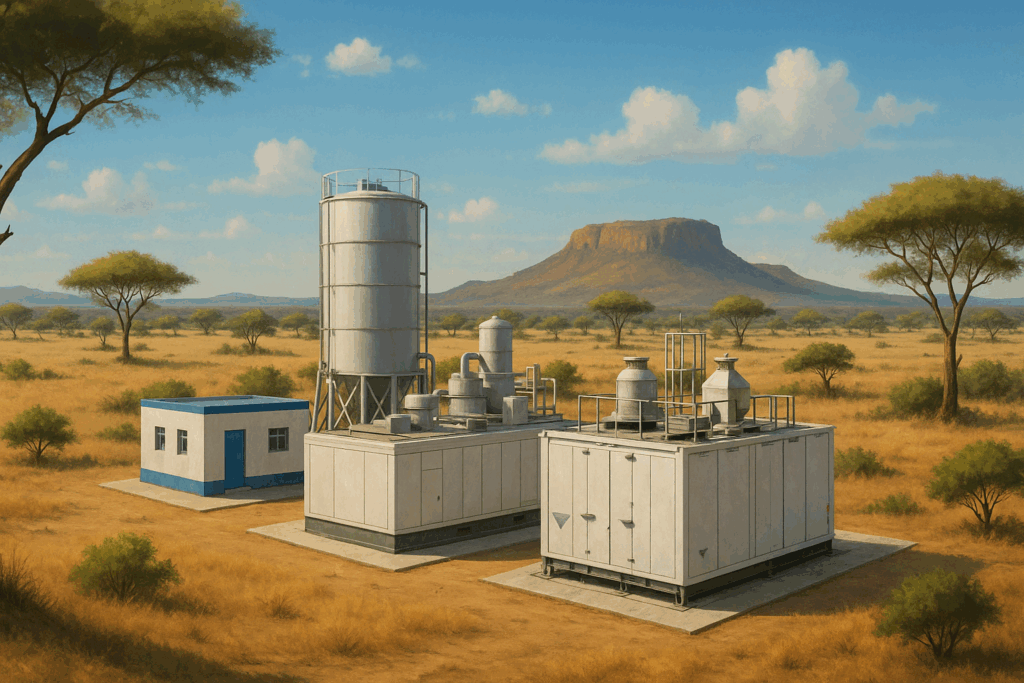Zimbabwe is considering the introduction of a Korean small-scale reactor. Korea Hydro & Nuclear Power (KHNP) has signed an agreement with the Centre for Education, Innovation Research and Development (CEIRD) to this end. The project focuses on a feasibility study that will analyze potential locations, technical requirements, and the benefits of nuclear energy for Zimbabwe. The cooperation also includes expert training and the exchange of technological expertise in the field of SMR technology.
Research in Zimbabwe as a Driver of Vision 2030
The CEIRD has been coordinating research projects between universities, industry, and government institutions since 2020. The goal is to translate scientific research into marketable products. This is intended to accelerate industrialization and support modernization. The foundation is the national strategy “Heritage-Based Education 5.0,” which emphasizes practice-oriented research and is directly linked to Vision 2030.

Image: AI-generated
KHNP points out that Zimbabwe is heavily dependent on hydropower and thermal power plants. Many plants are outdated, and climate change is exacerbating uncertainty. For this reason, nuclear energy is increasingly coming into focus. “Consequently, the country is actively considering the introduction of nuclear power to diversify its energy portfolio and achieve its Vision 2030 national development policy, which focuses on science and technology,” KHNP stated. Thus, the planned introduction of SMR technology fits perfectly into the strategic framework.
Nuclear Energy as Part of the National Energy Supply
With the agreement, Zimbabwe hopes to reduce its dependence on traditional energy sources. The goal is a sustainable energy supply that can withstand growing demand. KHNP sees the memorandum as a “significant turning point in establishing Zimbabwe’s mid-to-long-term energy strategy.” This assessment underscores the importance of nuclear energy for the country.
KHNP President Hwang Joo-ho emphasized: “Through this business agreement, we hope Zimbabwe will accelerate its energy diversification and find sustainable energy solutions through SMRs.” At the same time, this offers the company the opportunity to establish its own SMR technology in a region with growing energy demand.
SMR Technology: Development and Global Interest
The Korean i-SMR model is based on a 170-megawatt pressurized water reactor. It requires only a third of the investment costs and can be built twice as fast as large reactors. According to KHNP, the standard design is expected to be available by the end of 2025, and approval is expected in 2028. This could enable SMR technology to be quickly integrated into the global energy supply.
Internationally, KHNP uses major conferences to publicize the technology. At the COP28 climate conference in Dubai, the company presented its SMR technology and the concept of a “Smart Net-Zero City.” Agreements were reached there with partners from Indonesia and Jordan. Discussions are also underway with Norway and Sweden regarding potential collaborations.
Opportunities and Challenges for Zimbabwe
The cooperation with KHNP opens up new prospects for Zimbabwe. A stable energy supply strengthens the economic base, reduces outages, and attracts investors. In addition, the planned training program could create a regional center of excellence for nuclear energy. However, the start of this process requires long-term investments, international safety standards, and consistent implementation of Vision 2030.
The ongoing feasibility study aims to clarify whether a project based on SMR technology is technically and financially feasible in Zimbabwe. This will determine whether nuclear energy will become a central component of the future energy supply and whether the country will initiate a profound transformation.
